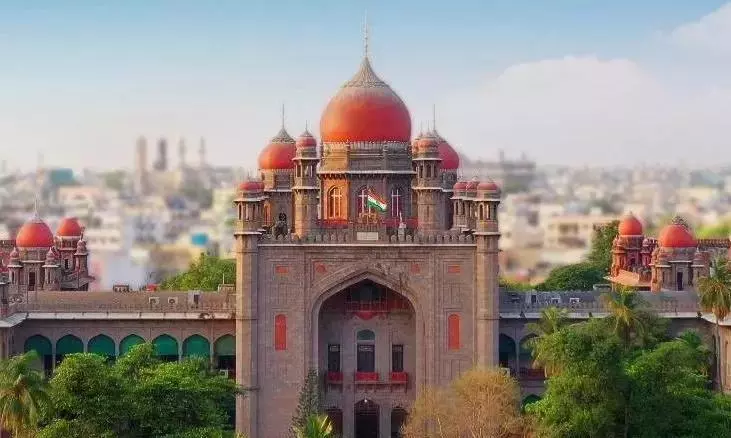Telangana HC Admits Plea on Fee Hike
The petitioner contended that the school increased fees without constituting an executive body and a governing body as required by law and in accordance with court directives

Hyderabad: Justice K. Lakshman of the Telangana High Court admitted a writ petition alleging blatant disregard for court orders and violation of constitutional provisions by the inaction of district educational authorities in connection with an abnormal fee hike by a private school. The judge took on file a writ petition filed by the Zee High School Parents Association challenging the inaction of government officials in addressing the steep and unauthorised fee hike implemented by the Zee High School unit of Life Kare Educational Society. The hike reportedly affected classes from Nursery to Class XII and was carried out without adherence to the mandated procedures. The petitioner contended that the school increased fees without constituting an executive body and a governing body as required by law and in accordance with court directives. Relying on judicial precedents, the petitioners emphasised that private educational institutions must form appropriate regulatory bodies before finalising any fee structure. The petitioners further argued that the failure of respondent authorities to intervene not only violated the Constitution but also eroded judicial authority and compromised transparency and fairness within the education system. The respondents sought time to file their response.
Anticipatory bail in abetment case
Justice J. Sreenivas Rao of the Telangana High Court granted anticipatory bail to a businessman accused of abetting suicide. The judge was hearing a criminal petition filed by M. Suresh Babu, a resident of Mulugu district. According to the prosecution, the de facto complaint alleged that the petitioner, who runs a seed business, instigated the complainant’s husband to cultivate maize, which ultimately resulted in financial loss and alleged mental harassment, leading to his suicide. Counsel for the petitioner argued that the accusations were unfounded and that there were no specific allegations suggesting instigation to suicide. It was contended that the alteration of the offence from Section 194 which provides for affray to Section 108 of the BNS which provides for abetment to suicide was based on a single witness's statement and lacked supporting material. The petitioner contended that there were no claims regarding substandard seeds or any criminal antecedents on his part. Considering that seven witnesses were examined and the petitioner had no prior criminal record, the judge enlarged the petitioner on conditional anticipatory bail.
Relief for private hospital
Justice E.V. Venugopal of the Telangana High Court directed the district medical and health officer (DMHO), Hanamkonda, not to take any coercive steps against Rohini Medicare Pvt. Ltd., a private hospital, in a writ petition challenging the legality of certain notices issued by the state health department and the clinical establishments authority. The judge was dealing with a writ plea filed by the hospital questioning the validity of two separate communications of March 2025. The first notice was issued by the competent authority, recommending cancellation of the hospital’s registration under various sections of the Clinical Establishments (Registration and Regulation) Act, which empower authorities to cancel a clinical establishment’s registration for non-compliance with the conditions of registration and hold individuals responsible for violations committed by the institution. The second notice, issued by the DHMO, alleged that the hospital engaged in “false” and “suspicious” activities. The allegations against the petitioner hospital were that it was involved in fake bills related to Chief Minister’s Relief Fund (CMRF). The petitioner contended that the notices were arbitrary, illegal, and violative of the principles of natural justice, apart from infringing fundamental rights guaranteed under the Constitution. After hearing the petitioner, the judge directed the authorities not to initiate any coercive action against the hospital until Monday and directed the government pleader to get instructions in the matter.
Whistleblower alleges forgery
Justice N.V. Shravan Kumar of the Telangana High Court took on file a writ plea challenging the inaction of senior officials of the State Bank of India and Central Vigilance Commission in addressing alleged internal forgery in sanctioning a loan at one of the bank’s Hyderabad branches. The judge was hearing a writ plea filed by Kanuru Subbaiah Choudary, a former employee of the SBI, who claimed to have acted as a whistleblower by reporting the fabrication of an internal document, a comfort letter that was used to sanction an accommodative loan to a borrower, Sri Krishna Polymers, at the bank’s SME Hyderabad branch. The petitioner alleged that although the bank internally investigated the matter thrice, it failed to identify and take action against the internal perpetrators and conspirators involved in fabricating the document. The petitioner contended that the matter was wrongfully classified as “non-vigilance,” resulting in only minor penalties to certain staff members while shielding others responsible for the alleged forgery. The petitioner alleged that he was wrongfully terminated from service after registering his complaint and sought directions to the CVC and the SBI to refer the matter to an independent investigating agency to identify and take action against those involved in fabricating the comfort letter between the bank’s internal branches. The judge ordered notice to the respondent authorities and posted the matter for further consideration.

